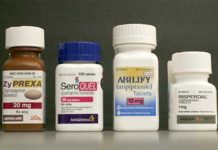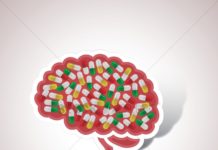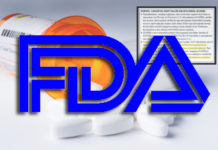Tapering Strips Help People Stop Using Antidepressants, Study Finds
A new study by Peter Groot and Jim van Os investigated whether tapering strips can help people stop using antidepressants.
Very Slow Taper Best for Antipsychotic Discontinuation
An article in JAMA Psychiatry advises very slow tapering for best results when discontinuing antipsychotic drugs.
An FDA Whistleblower’s Documents: Commerce, Corruption, and Death
In 2008, a reviewer of psychiatric drugs at the FDA, Ron Kavanagh, complained to Congress that the FDA was approving a new antipsychotic that was ineffective and yet had adverse effects that increased the risk of death. Twelve years later, a review of the whistleblower documents reveal an FDA approval process that can lead to the marketing of drugs sure to harm public health.
Antipsychotics Associated with Severe COVID-19 and Fatal Outcomes
A new study has found a strong association between antipsychotic drugs and higher rates of severe cases of COVID-19.
Strategies for Tapering and Discontinuing Antidepressants
A new review of strategies to support both patients and practitioners through the process of discontinuing antidepressants.
Service-User Knowledge Helps Researchers Develop Psychiatric Drug Tapering Approaches
New strategies for tapering psychiatric drugs achieved by acknowledging withdrawal symptoms and valuing service-users’ first-hand knowledge.
For People “At Risk for Psychosis,” Antipsychotics Associated with Worse Outcomes
Researchers studied whether antipsychotics could prevent transition to full psychosis and found that the drugs worsened outcomes.
World Benzodiazepine Awareness Day 2020
This week on MIA Radio, we present the second part of our podcast to join in the events for World Benzodiazepine Awareness Day 2020...
Randomized Controlled Trial Confirms That Antipsychotics Damage the Brain
A new study published in JAMA Psychiatry connects antipsychotics with damage to the brain in multiple areas.
Youth Antidepressant Use Associated With Increased Suicide and Self-Harm
National data on rates of youth antidepressant prescription, suicide, and self-harm in Australia sparks public health debate about drug safety.
Study Finds SSRIs Associated with Increased Risk for Violent Crime
Study finds an apparent connection between SSRIs, the most commonly prescribed type of antidepressant, and increased risk of violent crime.
JAMA Psychiatry Retracts Antidepressant Study
Once an appropriate statistical method was used, the study findings were “no longer valid,” according to the editors of JAMA and JAMA Psychiatry.
Review Documents Severe Withdrawal Effects of Psychiatric Drugs
Researchers find that most psychiatric drugs cause severe withdrawal despite attempt s to gradually decrease the dosage.
New Analysis: Antidepressants Still Linked to Suicide
“This is remarkable for drugs that are used to treat depressive symptoms,” write the researchers.
New Algorithms Fail to Predict Antidepressant Treatment Outcomes
Researchers suggest that because most antidepressant “success” is due to the placebo effect, they may never find a way to predict outcomes.
No Good Evidence That Antidepressants Prevent Relapse
Trials of antidepressants for relapse prevention are confounded by withdrawal effects caused by the drugs.
Neuropsychological Tests Reveal Consequences of Polypharmacy
Neuropsychological assessments reveal the cognitive, occupational, and social impact of polypharmacy in psychiatry.
Do Antipsychotics Protect Against Early Death? A Review of the Evidence
Psychiatry is now claiming that research has shown that antipsychotics reduce mortality among the seriously mentally ill. A critical review of the literature reveals that this claim is best described as the the field's latest "delusion" about the merits of these drugs.
Antidepressant Misinformation Promoted on Popular Websites
A new study indicates that popular online resources do not accurately present the scientific evidence on the risks and benefits of antidepressants.
Antipsychotic Trials Show Increasing Placebo Response and Declining Drug Response
A new review of antipsychotic trials conducted over the last 24 years finds that the placebo response rate is steadily increasing, and drug response is decreasing.
Antidepressant Use Continues to Climb Among Youth on Medicaid
New study finds that Medicaid enrolled youth were 14 times more likely to be on an antidepressant in 2014 than in 1987.
Researchers Find Paroxetine Harms Developing Brain
Researchers at Johns Hopkins test paroxetine on developing brain cells and discover numerous neurotoxic effects.
Does Longer Duration of Untreated Psychosis Cause Worse Outcomes?
New research counters the long-held assumption that a longer duration of untreated psychosis is associated with worse outcomes.
Benzodiazepines Linked to More Emergency Department Visits
Recent research implicates benzodiazepines as being involved in a high rate of emergency department visits in the US.
Suicide Warning on Antidepressant Label is Justified, Researchers Say
Researchers confirm that the suicide warning for antidepressants is justified by the evidence and that claims that the warning is harmful lack support.

































